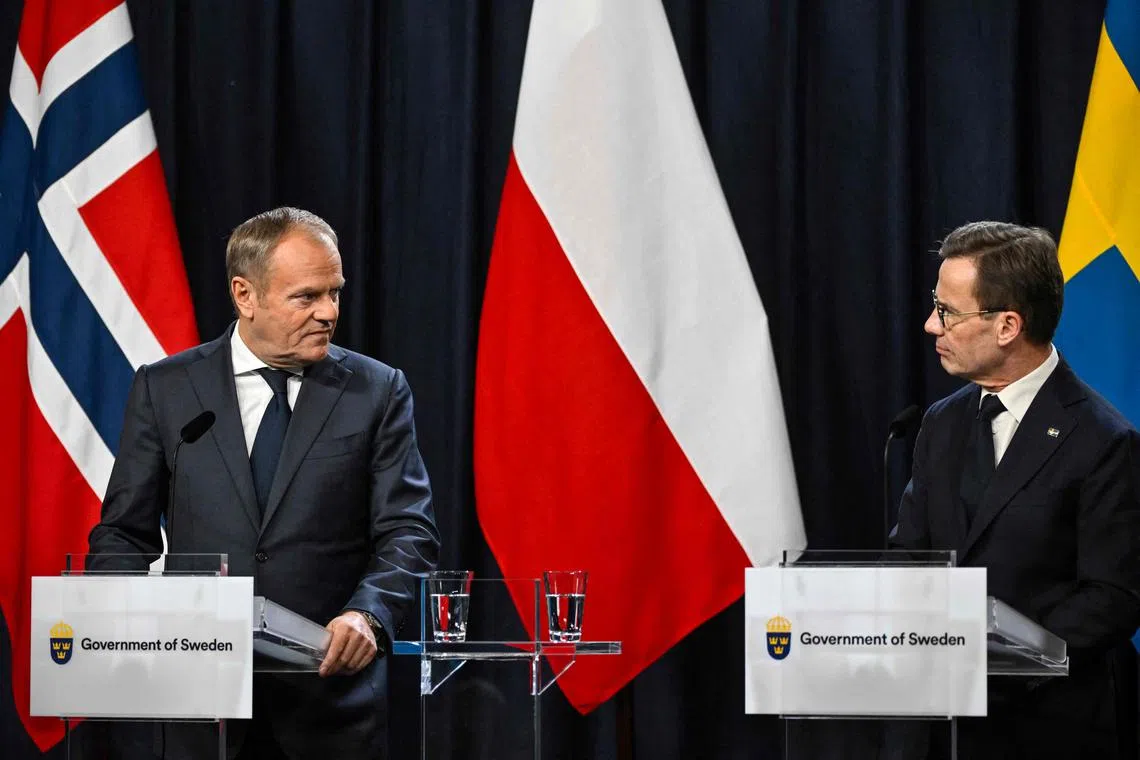Poland proposes Baltic Sea policing mission after cables cut
Sign up now: Get ST's newsletters delivered to your inbox

Polish Prime Minister Donald Tusk (left) and Swedish Prime Minister Ulf Kristersson holding a press conference for the Nordic-Baltic Summit, in Sweden, on Nov 27.
PHOTO: AFP
STOCKHOLM - Poland’s Prime Minister Donald Tusk on Nov 27 said that he wanted to create a Baltic Sea policing mission to protect infrastructure after two Baltic Sea cables were cut last week.
Sections of two telecom cables were cut on Nov 17 and 18
Swedish and Finnish police have opened investigations and European officials have said they suspect sabotage linked to Russia’s invasion of Ukraine.
The Kremlin has rejected the comments as “absurd” and “laughable”.
“We share the assessment of the security situation, including concern for critical infrastructure and strategic resources along the Baltic Sea,” Mr Tusk told a press conference, alongside his counterparts from Denmark, Estonia, Finland, Latvia, Norway and Sweden.
“We need new tools and ambitious means to counter threats. This is why I propose today to create a Baltic Sea policing mission,” he continued.
Mr Tusk added that he was “really happy that my colleagues found it interesting, and we will continue our work on some details.”
Suspicions have been directed at a Chinese ship - the Yi Peng 3
The Yi Peng 3 has remained anchored in the narrow Kattegat strait between Sweden and Denmark since Nov 19. China’s foreign ministry has denied any responsibility in the matter.
Denmark’s navy said last week it was shadowing the vessel, which is in international waters. Sweden’s coast guard joined it over the weekend.
The Wall Street Journal reported on Nov 27 that sources said investigators suspected that the vessel had dragged its anchor along the seabed for over 160km in order to deliberately cut the cables.
Lithuania on Nov 27 announced it would set up a joint investigation team with Sweden and Finland and coordinated by Eurojust - the EU’s judicial cooperation agency - to probe the damage to the cables.
In a statement, the Lithuanian prosecutor-general’s office said investigators would try to establish “whether the cables were damaged by deliberate acts for subversive or terrorist purposes”.
Tensions have mounted around the Baltic Sea since Russia’s invasion of Ukraine in February 2022.
In September 2022, a series of underwater blasts ruptured the Nord Stream pipelines
In October 2023, an undersea gas pipeline between Finland and Estonia was shut down


